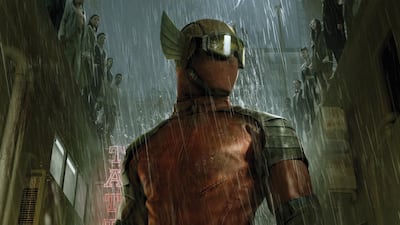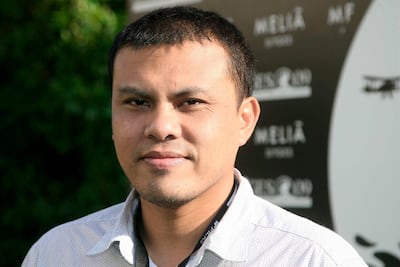Marvel's Avengers may bring in billions at the box office, but Indonesia is taking on the likes of Captain America and Iron Man with its own superhero franchise, tapping into growing global demand for diverse characters.
The first movie of the series, Gundala, which was directed by one of Indonesia's most prolific filmmakers, Joko Anwar, and released locally to critical and popular acclaim, is now set to play in cinemas across North America.
With a back catalogue of more than 500 Indonesian comics, the studio Screenplay Bumilangit is hoping to create its own Marvel-style Cinematic Universe with films featuring interconnected characters and settings.
Gundala, based on a 1969 comic, tells of an impoverished factory worker's son who fights corruption and injustice after a lightning strike gives him superhuman powers.

"The story that people are going to see in our films is not about aliens attacking the earth because that's not our problem. Hollywood is going to deal with that," Anwar says.
"We're dealing with our country's oppressors and their super powers will come from our mythology," adds the director, explaining his twin passions growing up were films and Indonesian comic heroes.
The success of Black Panther and Captain Marvel, which both grossed more than $1 billion (Dh3.6bn) worldwide, as well as Wonder Woman, which made more than $800 million, has pushed US studios to search for more diverse stories and characters to reflect audience demand.
The former featured a predominantly black cast, was directed by African-American Ryan Coogler and tackled the battle for a fictional African kingdom, while the latter two star female superheroes leads, which is rare.
Marvel are now making their first Chinese superhero movie, Shang-Chi and the Legend of the Ten Rings based on a character that first appeared in 1973.
Classic mythology, modern battles
Indonesia's once-booming comic book industry waned in the late eighties as fans flocked to Marvel and other foreign offerings.
But the country's film-makers are confident the new series, which infuses this classic mythology and modern life, will have unique appeal at home and abroad.
"We're not only trying to provide some nostalgia, but also to expose younger generations to our own superhero stories," Bumilangit's creative general manager Iwan Nazif explains.
"I think the exposure is even greater with the Gundala movie as it raised the curiosity of both comic and film enthusiasts about local superheroes," he adds.
The second planned story follows female character Sri Asih, who has the strength of 250 men and leads a pack of other superheroes.
The film, based on a 1954 comic book, is being produced by female director Upi Avianto.
Other characters in the pipeline include Mandala, a machete-wielding warrior who can destroy objects without even touching them, and Si Buta Dari Gua Hantu, which tells of a blind martial arts fighter and his pet monkey sidekick.
"I never knew Indonesia had all these superhero characters until Gundala," says film buff Septian Dwi Putri.
"And I didn't think Indonesia could have a proper superhero movie with decent script. The special effects weren't bad either."
However, with swathes of Indonesia on lockdown because of the Covid-19 virus, the process has ground to a halt, says production manager Imansyah Lubis, adding that crew are unable to meet, shooting sites are closed, and even buying or renting equipment raises hygiene issues.
Pleasing die-hard fans
Prior to the pandemic, Indonesia's film industry had been on the ascent after hitting a low point in the 1990s, when there were almost no local productions.
But as the country of 260 million sees its middle class expand and incomes rise, there is growing interest in cinema.
The sector logged a record 50 million ticket sales last year.
But international blockbusters remain the big draw, and local film-makers admit it is difficult to compete with Hollywood's vast finances. Gundala was shot in 52 days and cost about $2m.
The most recent Marvel film, Avengers: Endgame, had a budget of more than $350m, while DC Comics' Joker, for which Joaquin Phoenix won the Oscar for Best Actor, is estimated to have cost more than $55m to make.
"It is extremely difficult to make because of the budget and human resources limitations," Anwar says.
But despite this, and the challenges of the novel coronavirus, he insists "we are in the golden age of cinema".
Gundala grossed $4.7m at cinemas nationally, more than doubling its production budget and a worldwide release will bring further revenues.
Still, mainstream success will mean winning over people such as Iron Man fan Disna Harvens.
"I was honestly sceptical at first, but I didn't find it cringe-worthy," he said after watching Gundala.
"As a die-hard fan of superhero movies, I hope I'll live long enough to see all the Indonesian superhero movie instalments."


